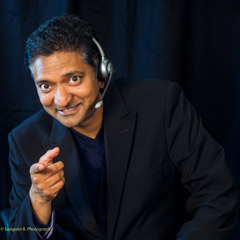 Naatak’s Harish Agastya in conversation withleading Indian playwright Anupama Chandrasekhar
Naatak’s Harish Agastya in conversation withleading Indian playwright Anupama Chandrasekhar
What is the first thought that comes to you when someone says call centers? Someone named ‘Mike’ you talked to at some point on the phone with a not-so-faint Indian accent? An opinion piece you read in your local newspapers about how outsourcing to countries like India was contributing to the unemployment rate here in the U.S.? That is, of course, the point of view most of us are used to. Until we come across Disconnect, Anupama Chandrasekhar’s brilliant play about the call center generation of India that turns the issue on its head and gives us the reverse perspective.
I first came across Anupama Chandrasekhar’s name in the British mediain early 2010. She was a new name in the theater circuit – she had just written her second play Disconnect, but the play’s unique perspective and its fast-paced witty narrative quickly captured the imagination of British audiences and critics alike. In the four years since, she has gained immensely in popularity as a playwright, especially in international circles – many of her plays have been performed acrossthe US, Canada and Europe and even been translated into languages like German and Czech. As my theater company Naatak now prepares to bring that same play Disconnect next month in front of Indian/Indian-American audiences in the Bay Area, perhaps things have come a full circle for Anupama now. I recently had a chance to catch up with Anupama as we began production planning for Disconnect.
Harish: What prompted you with Disconnect to look at the call center phenomenon not from the typical perspective (loss of jobs, drop in quality) but from the other side of the telephone?
Anupama: I found the utter theatricality of the phenomenon intriguing. Here you have young people essentially living a huge lie: they construct  elaborate identities for themselves, speak in accents not their own, try to forge relationships with people they’ll never meet, work nights, sleep days. Pretence is at the heart of the industry in much the same way as theatre is. And like theatre, the spoken word is of utmost importance. The parallels fascinated me and I wanted to explore the ideas.
elaborate identities for themselves, speak in accents not their own, try to forge relationships with people they’ll never meet, work nights, sleep days. Pretence is at the heart of the industry in much the same way as theatre is. And like theatre, the spoken word is of utmost importance. The parallels fascinated me and I wanted to explore the ideas.
Harish: Do you see that the socio-cultural disconnect – between the characters’ real personalities and their aspirational identities – that the play so beautifully illustrates might be pervasive even beyond the confines of the call center, into the fabric of urban India today?
Anupama: Oh yes. I’ve always felt that India lives in three different centuries at the same time. This socio-cultural divide was most apparent with the start of the IT boom. In the midst of conservatism and orthodoxy, there cropped up a new subculture of liberal-minded, financially self-sufficient young people aspiring to do and see things that their parents had never even dreamed of.
Harish: One of the unique and fascinating aspects of this script for me was the parallel narrative – the three reps all on calls at the same time. How challenging was it to go against conventional playwriting wisdom as you wrote those scenes?
Anupama: I wanted to capture the busy-ness and cacophony of a call center and the way the operators are so adept at multi-tasking: they carry on conversations among themselves while not missing a beat with their customers at the other end of the line. The content dictated the form. The play was originally commissioned by the Royal Court Theatre in London and I was given free rein to explore and experiment. If I’ve learnt one thing through my interactions with call center operators and various productions of Disconnect, it is this: the human brain is quite capable of making sense and forming a cohesive whole out of random fragments of conversations. We do it in our daily lives all the time. I’ve just tried to capture it on stage.
Harish: There are so many colorful characters in this play – Ross, the American-sounding star representative, Avinash, the old-fashioned manager, Jyoti, the young and vivacious executive. I know this is like asking a mother to pick amongst her kids, but which character in Disconnect feels the most interesting to you? Who and why?
Anupama: I would say Avinash. Avinash comes from a different century, an era of the written word and clearly defined work hierarchies. He is very much a fish out of water in this ultra-modern, youth-centric set-up. I wanted to explore the frictions and the tensions that ensue when an older person from the 20th century, with rather traditional attitudes to work and family, heads a group of liberal, free spirited youngsters of the 21st century. He is an outsider and knows the world is moving at a pace that he cannot keep up with.
Harish: I thought you might pick [the lead character of] Ross.
Anupama: I love Ross too. While researching the play, I met a call center agent who became the inspiration for Ross. The agent was from a small town in North India. His original passion and ambition had been to become an actor, which his family disapproved off. He joined a call center and found his mettle there, in the hotseat, because he had an uncanny ability to mimic the accent on the other end of the line. That’s how he was able to establish a rapport with his clients. He’d simply mimic their accents – Texan, New York, Californian – anything you threw at him. He said to me that in this job, he was a full time actor!
Harish: Your play Disconnect has been performed to critical acclaim in many cities around the world. In what way then is the current production of Disconnect by Naatak special to you?
Anupama: This is the first production of the play done entirely by Indians/first generation Indian Americans, hence very close to my heart. Many of Naatak members are techies and I’m sure they’ll bring to the production an added layer of realism and finer details. I’m also certain they’ll be able to capture the rhythms, nuances and differences of the various Englishes that I’ve used in Disconnect.
Naatak’s 45th production Disconnect will play in the Bay Area, California from June 6-22. Tickets available from $16. More information at www.naatak.org.
Harish Agastya is Board Member and Head of Operations at Naatak, and Director of the company’s upcoming production of Disconnect. Naatakis an South Asian American theater company, founded in 1995with the goal of bringingthought-provoking theater with Indian/South Asian themes to American audiences. After 44 theater productions over 18 years, watched by over 35000 people, Naatak is now one of the oldest and most successful South Asian theater companies in America. Naatak is a registered 501c(3) non-profit organization.






